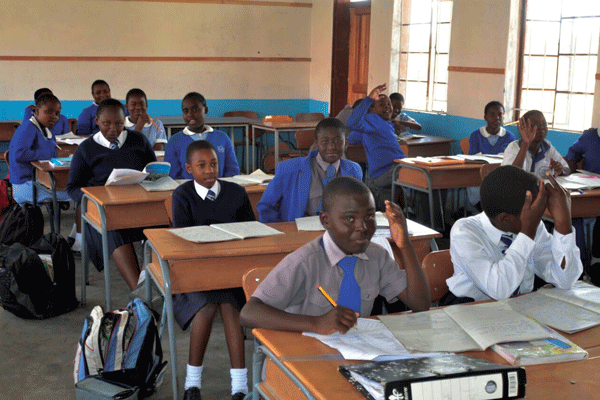
BY HARRIET CHIKANDIWA
GOVERNMENT has suspended indefinitely the reopening of schools next week, citing the rising number of COVID-19 infections and threat posed by Cyclone Chalane that is expected to ravage the southern party of the country starting today.
Schools were due to open on January 4 for the first term of the year but government said only examination classes will now be allowed back in schools to complete their tests.
Heavy winds and rainfall associated with the cyclone hit Chipinge and Chimanimani yesterday.
Primary and Secondary Education secretary Tumisang Thabela said the decision was reached at after realising that the country was experiencing resurgence in COVID-19 infections.
“The Ministry of Primary and Secondary Education would like to advise its valued learners, parents, guardians and other stakeholders, that in light of the surge in COVID-19 infections and the new and more contagious variants of the disease as well as the threats posed by Cyclone Chalene, government has seen it fit to deviate from the previously announced 2021 school calendar that directed schools to be open on January 4 2021,” Thabela said.
“In this regard, please be advised that 2020 ZIMSEC O and A level examination will resume on January 5 2021 to February 5 2021 as previously announced.”
Thabela added: “Having deferred the opening of schools beyond January 4 2021, the date for the commencement of the 2021 school calendar for all primary and secondary schools will be announced in due course as government monitors the situation.
- Chamisa under fire over US$120K donation
- Mavhunga puts DeMbare into Chibuku quarterfinals
- Pension funds bet on Cabora Bassa oilfields
- Councils defy govt fire tender directive
Keep Reading
“In the meantime, heads of schools should continue with preparations for the safe opening of schools and accelerated implementation of teaching and learning activities.”
Players in the education sector have been urging the government to reconsider its decision to reopen primary and secondary schools given the rising cases of COVID-19 infections and fatalities in the country.
Against bickering from teacher unions, on September 28, government pushed the reopening of schools after six months of closure due to COVID-19. The schools soon turned into COVID-19 hotspots, with a Bulawayo mission school, John Tallach recording over 190 cases and Chinhoy High School, 90 cases and so were many others.
Over 500 pupils, according to teacher unions, had tested positive to the virus by the time schools closed on December 18 after opening only for three months.
Zimbabwe Teachers Association (Zimta) president Sifiso Ndlovu said the government had taken a good precautionary measure to prevent many casualties.
“I think it is a good precautionary measure which is acceptable, we have to protect people from the Cyclone and the rising COVID-19 cases, it is a good precautionary measure to prevent many casualties,” Ndlovu said.
Amalgamated Rural Teachers Union of Zimbabwe (ARTUZ)’s president Obert Masaraure said the continued incapacitation of teachers coupled with the ravaging COVID-19 pandemic would likely have impacted the smooth opening of schools as planned on January 4.
“The incapacitation crisis, COVID-19 crisis and Cyclone Chalane crisis would have made it impossible for schools to efficiently open doors for learning.”
Meanwhile Information minister Monica Mutsvangwa yesterday said government has deployed sub aqua units from the police and personnel from Zimbabwe Defence Forces to assist potential victims in Chimanimani, Chipinge, Gutu, Bikita; areas likely to be affected by the cyclone.
Zupco buses have also been deployed to evacuate villagers from low lying land.
“Districts most likely to be affected by Chalane include Chimanimani, Chipinge, Mutare, Gutu, Buhera and Bikita, with possibility of receiving above 100mm of rain within three days. The rest of the country is expected to receive rainfall between 50-100mm during the same period,” Mutsvangwa said yesterday.
“We have identified and equipped evacuation centres with tents, blankets, food items, toiletries and other essentials,” Mutsvangwa said.
“We have already started evacuation of people to safer areas. Every district expected to be affected by the tropical depression has come up with evacuation plans which are being coordinated by government and other stakeholders.
“The Ministry of Higher and Tertiary Education, Innovation, Science and Technology Development, conducted geo-spatial mapping of the areas likely to be affected and this greatly assisted in coordinating evacuation efforts.”











